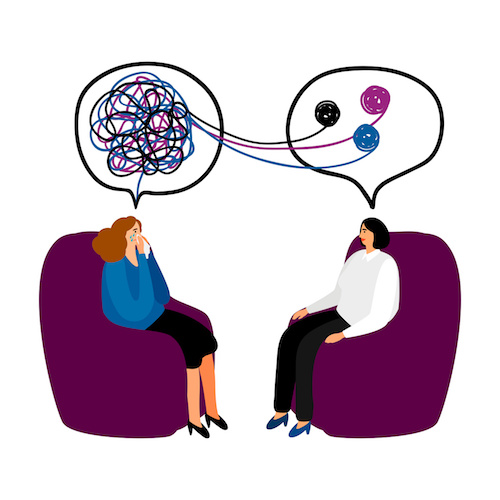The Significance of Mental Health: a Deep Dive Into Counseling, Treatment, and Their Advantages
Mental health substantially shapes individual wellness, affecting habits, feelings, and thoughts. Therapy and treatment act as vital methods for recovery and personal advancement. They use organized assistance, aiding people browse life's challenges. Many remain uninformed of the specific kinds of therapy readily available and their distinct advantages. Comprehending these aspects is necessary for any individual considering professional mental health and wellness support. What follows may light up paths to resilience and satisfaction that many forget.
Comprehending Mental Health and Its Effect
Psychological wellness is often overlooked, it plays a crucial role in overall well-being and everyday performance - Couples Therapy. It includes emotional, psychological, and social variables that influence just how people think, feel, and behave. An individual's mental health and wellness directly impacts their capacity to handle anxiety, associate to others, and make choices. Poor mental wellness can result in numerous problems, including anxiousness, clinical depression, and difficulty in maintaining relationships, every one of which can hinder individual and expert growth.Furthermore, psychological wellness has far-ranging implications for physical health and wellness. Chronic anxiety and untreated psychological problems can contribute to numerous physical ailments, such as heart disease and weakened immune feedbacks. Alternatively, positive psychological health cultivates strength, allowing people to manage life's obstacles efficiently. Recognizing mental health's value is crucial for fostering encouraging settings that promote psychological health, thereby enhancing the lifestyle for areas and people alike
The Various Kinds Of Counseling and Treatment
In the domain name of mental health and wellness, various therapy and therapy types deal with varied requirements. Private therapy methods concentrate on individual issues with one-on-one sessions, while team therapy characteristics foster shared experiences and support among individuals. Recognizing these techniques is important for picking the suitable treatment for different challenges.
Private Therapy Approaches
Numerous specific therapy methods exist, each made to attend to specific mental wellness concerns and deal with varying client demands. Cognitive Behavior Modification (CBT) concentrates on identifying and transforming adverse idea patterns, while Psychodynamic Treatment explores past experiences and unconscious processes. Humanistic Therapy highlights individual growth and self-actualization, fostering a helpful setting. Interpersonal Therapy (IPT) targets relationship issues and interaction patterns to improve emotional well-being. Additionally, Approval and Commitment Therapy (ACT) motivates clients to accept their thoughts and feelings while committing to individual values. Each technique provides distinct strategies and ideologies, permitting experts to customize their methods to the individual, consequently boosting the healing experience and promoting psychological wellness recuperation.
Group Therapy Characteristics
Group treatment dynamics incorporate different healing approaches that leverage the power of social relationships and shared experiences. This type of therapy typically consists of diverse groups, cultivating a safe environment for participants to reveal thoughts and sensations. Secret kinds of team therapy consist of support system, which provide psychological assistance; process-oriented teams, concentrating on interpersonal communications; and psychoeducational groups, aimed at imparting understanding concerning mental health and wellness issues. The characteristics within these teams can boost self-awareness, as participants frequently show on their actions in connection with others. Additionally, group therapy cultivates a sense of belonging, decreasing feelings of isolation. Via shared stories and cumulative analytic, participants can create dealing approaches and gain insights, eventually adding to individual growth and recovery.
The Role of Counseling in Mental Health And Wellness
Counseling plays a crucial role in mental health and wellness by using different approaches tailored to private needs. These techniques offer professional assistance that can result in considerable renovations in emotional wellness. Understanding the various types of counseling can assist people make notified decisions regarding their mental healthcare.

Types of Therapy Strategies
While various counseling strategies exist, each offers special techniques and understandings into psychological health treatment - Couples Therapy. Amongst the most noticeable are cognitive-behavioral treatment (CBT), which concentrates on changing unfavorable thought patterns; psychodynamic therapy, which explores subconscious procedures and childhood years experiences; and humanistic approaches, stressing personal development and self-actualization. Furthermore, solution-focused short treatment prioritizes locating options in the here and now as opposed to delving right into problems. Group therapy fosters area and shared experiences, while family treatment addresses relational dynamics within domestic structures. Each technique accommodates various requirements, straightening with private preferences, concerns, and healing objectives. Understanding these techniques helps clients make educated selections concerning their psychological wellness journey and promotes effective treatment tailored to their one-of-a-kind conditions
Advantages of Professional Assistance
Many people gain from specialist advice in handling their mental health and wellness obstacles. Therapy provides a safe area for customers to discover their ideas and feelings without judgment. This therapeutic setting promotes self-awareness, enabling individuals to determine patterns in their habits and create much healthier coping strategies. Professional advice likewise offers accessibility to evidence-based techniques that can ease symptoms of anxiety, anxiety, and other psychological health and wellness issues. Therapists can help in establishing realistic goals and provide assistance in attaining them, boosting overall health. The collective relationship in between therapist and client is vital, as it promotes accountability and motivates individual development. Ultimately, specialist advice plays a crucial function in steering psychological wellness journeys, causing improved emotional strength and life fulfillment.
Benefits of Treatment: Recovery and Growth

Just how to Pick the Right Specialist or Counselor
Just how can one browse the frequently frustrating procedure of choosing the best therapist or therapist? Determining personal needs is crucial; people must consider their certain problems, whether partnership, anxiousness, or clinical depression difficulties. It is helpful to study various healing approaches, such as cognitive-behavioral therapy or psychodynamic therapy, to discover a suitable match.Next, potential clients must look for recommendations from relied on resources or make use of on the internet directory sites. It is important to examine specialists' qualifications, including their education and learning, licensing, and locations of specialization. Arranging first assessments can help determine compatibility, allowing individuals to evaluate communication styles and personal comfort.Finally, logistical factors, such as area, accessibility, and fees, should additionally be thought about. By attentively considering these aspects, one can make an educated choice, eventually cultivating a restorative connection that supports mental health and personal development.
Getting Over Stigma: Welcoming Mental Health And Wellness Assistance
While social perspectives towards psychological health and wellness have actually advanced, preconception still presents a significant barrier for lots of looking for support. This stigma frequently shows up as misconceptions bordering mental disease, leading people to really feel shame or worry concerning their struggles. Lots of people think twice the original source to pursue counseling or treatment as a result of fret about being evaluated or labeled. Conquering this stigma is basic for fostering a supportive atmosphere where individuals can honestly review their psychological health needs.Communities and organizations play a crucial function in this makeover by promoting awareness and education concerning mental health and wellness concerns. Efforts that highlight individual stories can humanize these experiences, urging others to he has a good point seek aid without worry. As acceptance expands, people may feel a lot more encouraged to accept mental wellness support, recognizing it as an essential aspect of total health. By taking down preconception, society can cultivate a society of understanding, empathy, and proactive psychological healthcare.
Methods for Maintaining Psychological Well-Being Beyond Therapy
Therapy supplies useful support, maintaining mental well-being outside of sessions is just as vital. Individuals can apply several techniques to maintain their mental health and wellness. Regular exercise plays a vital role, as exercise advertises the release of endorphins, which boost mood. In addition, a balanced diet regimen abundant in nutrients can considerably affect psychological security and power levels.Practicing mindfulness and reflection helps people take care of tension and create higher self-awareness. Establishing a consistent sleep regimen is likewise basic, as quality rest is vital for cognitive feature and emotional regulation.Engaging in social activities promotes link and reduces sensations of seclusion. Going after hobbies or interests can provide an imaginative outlet and increase self-esteem. Exercising and establishing practical goals self-compassion allows people to cultivate durability. By integrating these techniques into everyday life, individuals can successfully sustain their psychological wellness past treatment sessions.
Regularly Asked Concerns

How Can I Inform if I Required Treatment?

Figuring out the requirement for treatment commonly involves identifying consistent feelings of sadness, anxiousness, or frustrating anxiety. If daily working becomes difficult or coping systems fall short, seeking expert assistance may be a beneficial progression.
What Should I Expect in My First Therapy Session?
In the first treatment session, individuals can anticipate an intro, discussion of their factors for seeking help, and an overview of the therapist's technique, producing a foundation for future discussions and image source establishing comfort in the healing area.
Are Online Therapy Sessions as Effective as In-Person Ones?
Research suggests that online therapy sessions can be as reliable as in-person ones. Factors such as the therapist's certifications, client engagement, and the therapeutic relationship greatly affect end results, regardless of the medium utilized.
Can Therapy Aid With Relationship Issues?
Treatment can assist people in dealing with connection problems by providing tools for interaction, understanding feelings, and fixing disputes. Cognitive Behavioural Therapy. It advertises much healthier characteristics and encourages individual development, ultimately cultivating more powerful, more fulfilling links between companions
The Length Of Time Does Treatment Usually Last?
Therapy duration varies substantially based upon specific demands and objectives. Normally, sessions might last from a couple of weeks to numerous months, with some people taking part in ongoing treatment to attend to long-term issues and individual growth. Cognitive Behavioral Therapy (CBT) focuses on identifying and changing negative idea patterns, while Psychodynamic Treatment checks out previous experiences and unconscious procedures. Secret kinds of team treatment include support groups, which offer psychological assistance; process-oriented teams, focusing on interpersonal communications; and psychoeducational groups, intended at giving knowledge concerning psychological health and wellness problems. Amongst the most famous are cognitive-behavioral treatment (CBT), which focuses on modifying unfavorable idea patterns; psychodynamic therapy, which checks out unconscious procedures and childhood years experiences; and humanistic approaches, emphasizing personal growth and self-actualization. Group treatment fosters community and shared experiences, while family treatment addresses relational dynamics within domestic frameworks. It is valuable to study various healing methods, such as cognitive-behavioral therapy or psychodynamic therapy, to locate an ideal match.Next, possible customers ought to look for referrals from relied on sources or use on the internet directories.